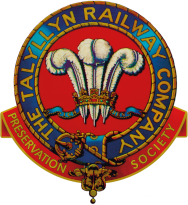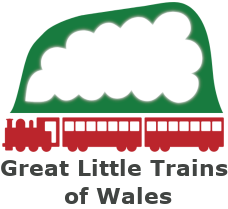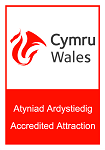MINUTES OF THE 58th ANNUAL GENERAL MEETING OF THE
TALYLLYN RAILWAY PRESERVATION SOCIETY
Held at Neuadd Pendre Social Centre, Brook Street, Tywyn, Gwynedd on September 27th, 2008
On the platform were Richard Hope OBE, President, TRPS; Gareth Jones, Chairman, TRPS; Peter Austin, Chairman, TR Co; Garry Mumford, Hon. Treasurer, TRPS and Accountant, TR Co; John Robinson, Hon. Secretary, TRPS and Secretary, TR Co, and Sue Whitehouse as Minute-taker. There were some 220 members present.
After a loud blast on a Guard’s whistle, Richard Hope opened the meeting at 3.30 pm by reading a letter from June Jones, in which she thanked all TR officials, volunteers and members for their tributes to the late Dai and their support and generous donations in his memory. Those present were asked to stand for a minute’s silence in respect of Dai and also of the late Phil Guest and John Cox.
1. Apologies
Apologies had been received from Vice-President James Boyd and nine other members.
2. Minutes of the 57th AGM
The Minutes of the 57th AGM of the Society, held at Tywyn on September 29th, 2007, having been circulated to members of the Society at that date, were proposed by Richard Hope to be taken as read; this was agreed without dissent and he duly signed the minutes as being a true record.
3. Matters arising from the Minutes
Mike Green, describing himself as a semi-retired staff member, thanked the Membership Secretaries for acting on his plea about the size of membership cards. Richard Hope was pleased that we had been able to do something.
4. Election of President
Gareth Jones took the Chair and asked the meeting to endorse the Council’s nomination of Richard Hope OBE as President. This was agreed without dissent.
5. Appointment of Independent Examiners
Richard Hope resumed the Chair. The appointment of Silver & Co as the Society’s Independent Examiners was proposed, seconded and agreed by the meeting. Richard Hope thanked Peter Silver for many years of loyal service.
6. Election of Honorary Secretary
John Robinson had been nominated in accordance with the rules; this was put to the meeting by Richard Hope and agreed without dissent.
7. Election of ten members of Council
John Robinson read out the names of the fourteen candidates and asked them to stand, with the exception of Martin Fuller, whose great height made it unnecessary, and Matthew Wear who was unable to attend the meeting owing to illness. Ballot papers were then collected. Later in the meeting Peter Silver announced the results, commending the strength represented by a field of fourteen and encouraging all to keep offering themselves for election; 244 papers returned, 1937 votes being cast as follows: Peter Austin 119, Matt Dawson 100, Martin Fuller 149, Bill Heynes 165, Gareth Jones 201, Ian Lloyd-Owen 132, Lis Mann 149, Ray Reid 85, David Room 97, Philip Sayers 158, John Smallwood 170, Keith Theobald 171, Matthew Wear 101 and Sue Whitehouse 140. Mesdames Mann and Whitehouse and Messrs Austin, Fuller, Heynes, Jones, Lloyd-Owen, Sayers, Smallwood and Theobald were declared elected.
8. Reception, Approval and Adoption of Reports
Richard Hope asked Peter Austin to brief the meeting about the previous Tuesday’s press release concerning proposed employee redundancies. Placing it in the context of the global financial situation and other heritage railways, he read some of the press release and reiterated his great regret at the necessity of cutting costs in this way as one of several “jigsaw pieces” in dealing with the situation. He added that the proposals had the full support of the Board and the Executive Committee.
Gareth Jones, presenting the Report of the Council, stressed the positive aspects within the global doom and gloom; many good things had happened in 2008, and all members and staff had worked very hard to keep the Railway going in a difficult economic situation. As an example, the liveries of locomotives No. 1 Talyllyn and No. 2 Dolgoch, especially coupled together for a 40th anniversary party in July, looked fantastic and this showed how an occasional bold move could work well. He paid tribute to Maurice Wilson, retiring from the thankless job of Locomotive Running Foreman; the meeting broke into applause. He also thanked Barbara Fuller for taking on the duties of Locomotive Roster Clerk, and then moved to reporting the improvements to the south side of Wharf, where the wooden cladding on the water tank was all but complete and the excavation of a large hole to accommodate the weighbridge platform, or, he suggested, to bury the Board, was in progress. It had been a great shame that storms had ruined the Rolt Rally after such huge efforts; the event was to be rested for a year and a special event held in 2010 for the centenary of Tom Rolt’s birth. Members had made a fantastic response to the Trecwn rail appeal, raising £50,000 in a few weeks, and the work done by employees and volunteers in response to the challenge of removing material from the Trecwn site showed the TR at its best. Three almost-new diesel locomotives, owned by a consortium of members, had arrived. The interests both of the Railway and of the owners would be protected by a carefully worded agreement before any work was done on them. The Talyllyn News would be circulated, from the December issue, in a clear wrapper, as a better deal had been struck with a new printer. This made the team of volunteer “stuffers” redundant and he expressed the Society’s gratitude to the present group and their predecessors over fifty-five years. The Executive Committee had functioned for almost a year; it aimed to increase the Society’s influence beyond the existing Board structure and to accelerate decision making, and this had, by and large, succeeded, despite the unpleasant nature of recent business. It needed further adjustment, however. Gareth praised everybody’s commitment to the TR, but stressed that the financial situation was extremely serious and any decisions taken were in the best interests of the Railway; the Board and Executive Committee had been monitoring matters since the early spring, and they would challenge anyone to find alternative solutions and positive ideas. He exhorted everyone to think not “what the Railway can do for me, but what I can do for the Railway”.
Richard Hope then invited questions. There was one respondent; Diane Tucker, attending her first AGM, expressed a wish to get involved in the Railway and wanted to know how; Gareth invited her to email him for further discussion.
Garry Mumford apologized for making a presentation with computer and projector for the third year in a row. He suspected that many members did not spend much time studying the Annual Accounts and hoped that the slides would help those present to understand the serious difficulties and complexities of the current situation. Like it or not, we had to run the TR as a commercial business in a harsh, indeed unprecedented in recent times, climate. The Strategic Plan had been cold-stored because the premises on which it had been based, eminently reasonable in 2006, no longer held true. Garry commended the phenomenal resilience of the TR (as witnessed by members’ loans and gifts in response to the Trecwn appeal) and predicted that, whilst difficult decisions had been necessary, we would find a way through, but pointed out that the existing reserves would have rapidly become exhausted without radical action. He presented a chart of comparative costs between 2006 and 2007, showing considerable extra staff expenditure and a rise in utility costs; part of the staff costs increase was due to employing a General Manager, but rising minimum wage levels also had an impact. He went on to say that further cuts were needed, that the 1,000 extra passengers spoken of in 2006 were not likely to appear in the near-term, and that the impact of the Welsh Highland opening could be considerable in 2009. On the other hand, the spend per head of visitors had actually increased in 2008 despite the perception of available spending money falling. He outlined four options for moving forward: reduce costs, increase revenue, seek out grants, or do things radically differently, and concluded with an invitation to submit questions privately or publicly and a reminder not to shoot the messenger.
Richard Hope, having thanked Garry for a clear presentation, invited specific financial questions. Andy Lawton asked that the PowerPoint slides be made generally available to members, which Garry agreed to. Lis Mann, referring to the 2007 Marketing plan, deplored that the Marketing Officer’s contract had just been terminated, saying we needed more resources for marketing, not less; Gareth Jones denied any accusation of cutting the budget or ceasing marketing, and Lis said she was talking not about an amount of money but a person.
Nigel Adams had asked Garry before the meeting why the Board and Council had not foreseen the large loss incurred in 2007, and wished to share the point with the meeting; Garry responded that it had been obvious by late 2007 that our financial performance had deteriorated, but it was felt sensible at the time to defer any immediate action until it could be seen how the 2008 season would develop. David White asked how much longer we had got, given a loss of £100,000 last year; Garry said that we should be severely squeezed through May 2009. Richard Hope observed that we had never habitually borrowed from members long-term. Roger Whitehouse asked questions about the contribution from Talyllyn Holdings, about the desirability of taking one-off items of expenditure out of the revenue account if one-off items of income were taken out and finally about what fare increases were planned for 2009. Garry replied that Holdings money, charity income, could not readily be granted for regular running costs. The one-off income was exceptionally a legacy to the Railway Company and he felt it had to be excluded from year-on-year comparisons. The large item of one-off expenditure had been capitalized, as explained in his written Report and shown in Note 6 to the Accounts. He believed that some fare increase was necessary with the currently rising inflation rate. Garry concluded that it was his job to paint a realistic, and perhaps therefore gloomy, picture and hoped he was wrong.
Eric Wooding, describing himself as an elderly volunteer, counselled against too much transparency, it being often a sign, paradoxically, of something to hide; he also advised against excessive gloom in published material, observing that the News and the website were available worldwide. Applause ensued. Gareth saw his point but said we had a responsibility to our members not to spring unpleasant surprises on them unnecessarily. Chris Price called these days a different age of information, saying that if information were not given fully, the membership would fill the gaps themselves and pass it on scrambled; a problem aired was a problem shared. Yet more applause followed.
Jonathan Mann, admitting he was the son-in-law of the self-styled elderly volunteer, and speaking for himself and others, reminded the meeting that our 1% fall in revenue held up well against other railways’ 15 to 20%, though our 12% fall in bookings was more worrying. He added that the money put into the Porter’s Platter refurbishment would have swallowed up some of the revenue, and he also feared that staff redundancies and any consequent buying-in of services would prove more expensive and less effective than using in-house resources. His other railway – at Launceston – had had a much worse year than the TR but the “books” were nothing like as bad. Jonathan moved to the matter of the Company’s computerized accounting system, on which he acknowledged Garry had worked very hard but the expenditure reports were not yet up and running; he asked whether independent examination would be able to reveal where the money was going. Acknowledging that the Accountant was presenting the worst case scenario, like Scotty aboard the Starship Enterprise, Jonathan warned that we were making a lot of judgments on this basis, and called for some assurance of balance. Garry reminded the meeting that the full benefits of the computing system had not yet been seen, but work was in progress; expenditure was fully recorded, but the time-consuming problem was to report it in an accurate and digestible form. Ian Kelly asked a question about monthly forecasting in the light of the annual “trough” in May; Garry assured him that it was felt this was manageable as some legacy income was in prospect. Alan Doe then enquired whether our managers were managing without a monthly report against budget; on being told they were, he said that made it very hard for the General Manager to manage and it was unheard of on his other railway (the Isle of Wight). Richard Hope responded that the TR had never had this facility. Gareth Jones said that, in fairness to Garry, he had not had the time to achieve this aspect of his system.
Martin Fuller asked whether any consideration had been given to reducing the timetabled service for 2009, and Gareth replied that it was not the wish of Council.
Richard Hope proposed the approval of the Report of the Council; it was carried with one vote against, Diane Tucker asking how it could be approved if members were not happy.
9. Boiler of locomotive No. 7 Tom Rolt
Richard Hope explained that the cost of repairs at the boilermaker had risen to about £22,500, of which approximately £7,000 had been raised to date; the collection would be in aid of this. Chris Price couched it in terms of £100 per person present, Gareth made it £75, and Garry pleaded with taxpayers to use Gift Aid and all donors to consider setting up standing orders. Bob Cambridge feared that if the money went into Holdings it would be “locked”, but David Mitchell assured him it would not and Richard Hope observed that there was nothing to prevent Holdings lending money to the Railway Company as opposed to granting it outright. David Mitchell said that 28p per £1 donated by Gift Aid could be claimed from the Chancellor of the Exchequer before he too ran out of money.
10. Miscellaneous announcements
Martin Fuller made a statement on the position regarding the election for the Traffic and Operating Committee, which had been postponed in view of various difficulties; a revised ballot paper was being sent out with a closing date of 14th November.
Philip Sayers announced that there had been no contest for election to the Young Members’ Committee, so all those nominated – Hannah Green, Andrew Simner, Andrew Thomas, Sarah Ventry and Alex Wright – were declared elected.
John Smallwood and Chris Price made announcements about the evening’s entertainments.
Gareth Jones appealed for members’ help at the Warley Model Railway Exhibition in November.
Tony Randall announced the Steampipes evening, 11th December, and the London Area Group Christmas dinner, 1st December.
Don Newing announced that the next East Midlands Area Group meeting would be in Loughborough on 9th October.
Sue Whitehouse corrected the date of the Carol Train, shown in the News as 13th December, to 20th December.
Keith Theobald made his customary plea for help during the Outdoor Weeks.
Nigel Adams announced the result of a competition to guess the identity of a leather-clad member photographed on a motorbike; it was Gordon Rhodes! The 7 winners were presented with £3 each and Garry was presented with the remaining £45 for the boiler fund.
Noel Williams announced the results of the October ‘Talyllyn Tote’ draw, adding that in 2008 the Tote had raised £1,627 for the Society. A special first prize of an Evening Driver Experience would be awarded in April 2009 to mark its fifth anniversary.
11. Members’ free travel
Richard Hope invited Nigel Adams to outline his proposals for amending the existing arrangements for members’ travel. Nigel estimated on the basis of traffic figures that allowing members free travel had cost the railway anything from £54,000 to £60,000 over the last three years; he proposed that it should be suspended for non-working members for two years, substituting 3 free journeys per year and privilege rate thereafter, which would mean that all members would be contributing to the financial support of the TR in difficult times. Nigel explained further about a few members misusing the free travel facility. Richard Hope reminded the meeting that the TRPS constitution was binding upon us, although a voluntary scheme could be tried. Chris Price, whose parents had joined the Society originally due to the attraction of free travel, cautioned against a knee-jerk reaction. George Gardiner agreed with him, and so did Lawrence Garvey who added that the amount of misuse was very small. Andy Lawton favoured Nigel Adams’ position, asking that misusers should be named and shamed; Pippa McCanna would prefer members to be encouraged to do some volunteer duties and thus earn their free travel. Simon Jenkins agreed with Chris Price. Steve Vince preferred to amend the constitution next AGM after a full review of the facts, while Ian Howitt proposed no action. A show of hands indicated that Council should revisit the issue.
12. Any other competent business
Tony Randall enquired about progress on the 2009 timetable leaflets; Peter Austin replied that production had been deferred to allow flexibility in the light of changing forecasts, but the plan was to have them ready for the Warley Model Railway Exhibition in November. Andy Lawton was concerned that delay would add to the cost. Gareth Jones described this as one of many difficult balancing acts. Also on the subject of timetable leaflets, Diane Tucker raised issues of legibility in the 2008 leaflet and was assured by Jonathan Mann that all feedback on this point had been addressed. Sarah Foster compared our 2008 leaflet very favourably to those of our competitors.
Keith Hayes thanked the Accountant for his efforts, and drew a round of applause, but asked why there was no monthly information system, and suggested someone should be paid to help Garry set one up, as otherwise Keith was unsure of his own confidence in the interim figures presented. Garry admitted that he was struggling for time to do all he would wish to.
John Appleford enquired about the take-up of the Utilities Warehouse scheme; Garry responded that it had been negligible and had not even covered the set-up costs which he had paid personally. John Appleford and John Smallwood reported positively on their experience of it. Kate Wenborn reported on a similar scheme run at her church and promised to provide further details later; Ruth Shepherd had knowledge of other schemes. Keith Theobald reported that Which? magazine had given a good report on Utilities Warehouse. Garry suggested that members should try it as it was an easy source of not insignificant income.
There being no other business Richard Hope declared the meeting closed at 1748.








